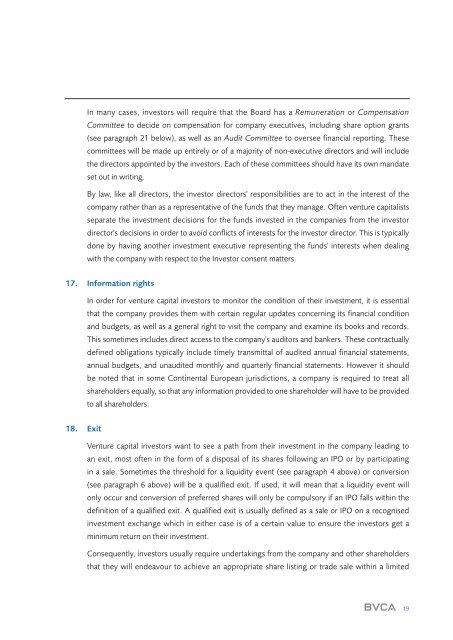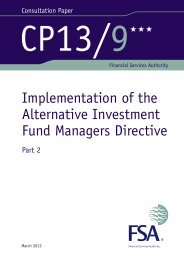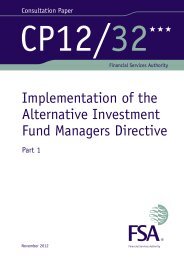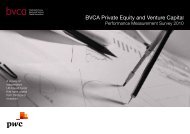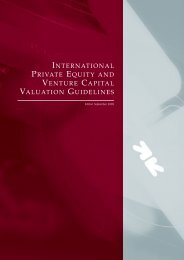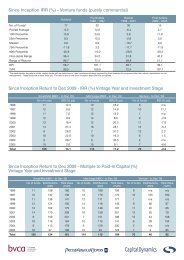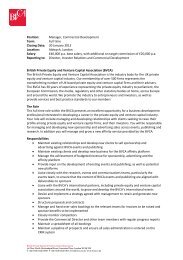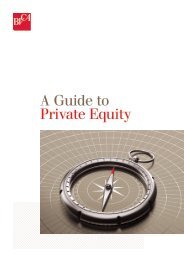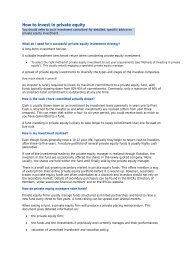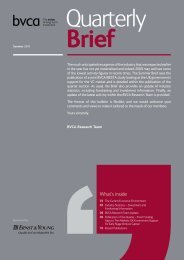Guide to term sheets - BVCA admin
Guide to term sheets - BVCA admin
Guide to term sheets - BVCA admin
You also want an ePaper? Increase the reach of your titles
YUMPU automatically turns print PDFs into web optimized ePapers that Google loves.
In many cases, inves<strong>to</strong>rs will require that the Board has a Remuneration or Compensation<br />
Committee <strong>to</strong> decide on compensation for company executives, including share option grants<br />
(see paragraph 21 below), as well as an Audit Committee <strong>to</strong> oversee financial reporting. These<br />
committees will be made up entirely or of a majority of non-executive direc<strong>to</strong>rs and will include<br />
the direc<strong>to</strong>rs appointed by the inves<strong>to</strong>rs. Each of these committees should have its own mandate<br />
set out in writing.<br />
By law, like all direc<strong>to</strong>rs, the inves<strong>to</strong>r direc<strong>to</strong>rs' responsibilities are <strong>to</strong> act in the interest of the<br />
company rather than as a representative of the funds that they manage. Often venture capitalists<br />
separate the investment decisions for the funds invested in the companies from the inves<strong>to</strong>r<br />
direc<strong>to</strong>r's decisions in order <strong>to</strong> avoid conflicts of interests for the inves<strong>to</strong>r direc<strong>to</strong>r. This is typically<br />
done by having another investment executive representing the funds' interests when dealing<br />
with the company with respect <strong>to</strong> the Inves<strong>to</strong>r consent matters.<br />
17. Information rights<br />
18. Exit<br />
In order for venture capital inves<strong>to</strong>rs <strong>to</strong> moni<strong>to</strong>r the condition of their investment, it is essential<br />
that the company provides them with certain regular updates concerning its financial condition<br />
and budgets, as well as a general right <strong>to</strong> visit the company and examine its books and records.<br />
This sometimes includes direct access <strong>to</strong> the company's audi<strong>to</strong>rs and bankers. These contractually<br />
defined obligations typically include timely transmittal of audited annual financial statements,<br />
annual budgets, and unaudited monthly and quarterly financial statements. However it should<br />
be noted that in some Continental European jurisdictions, a company is required <strong>to</strong> treat all<br />
shareholders equally, so that any information provided <strong>to</strong> one shareholder will have <strong>to</strong> be provided<br />
<strong>to</strong> all shareholders.<br />
Venture capital inves<strong>to</strong>rs want <strong>to</strong> see a path from their investment in the company leading <strong>to</strong><br />
an exit, most often in the form of a disposal of its shares following an IPO or by participating<br />
in a sale. Sometimes the threshold for a liquidity event (see paragraph 4 above) or conversion<br />
(see paragraph 6 above) will be a qualified exit. If used, it will mean that a liquidity event will<br />
only occur and conversion of preferred shares will only be compulsory if an IPO falls within the<br />
definition of a qualified exit. A qualified exit is usually defined as a sale or IPO on a recognised<br />
investment exchange which in either case is of a certain value <strong>to</strong> ensure the inves<strong>to</strong>rs get a<br />
minimum return on their investment.<br />
Consequently, inves<strong>to</strong>rs usually require undertakings from the company and other shareholders<br />
that they will endeavour <strong>to</strong> achieve an appropriate share listing or trade sale within a limited<br />
19


